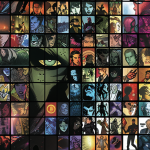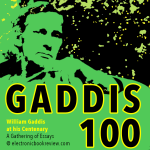Experiments in Generating Cut-up texts with Commercial AI
Polina Mackay, James Mackay
Can ChatGPT or other Chatbot interfaces really write anything better than a feeble imitation of postmodern cut-up techniques? Polina and James Mackay think so, and they offer some reasons for holding onto a human, guiding intelligence in the writing process.
Affect Aesthetic and Politics of the Book
Sol Heo (허솔)
A Review of Bookishness, by Jessica Pressman.
Comics as Big Data: The transformation of comics into machine-interpretable information
Ilan Manouach
Like so many generic literary reconstructions, comics are now being transformed into information -- a process that, for postdoctoral scholar Ilan Manouach, is concomitant with the expansion of tools and services in the field of generative AI. Like so many AI emergences (and emergencies), this one poses important challenges to the comics industry and the careers of comics professionals.
Automatism for Digital Text Surrealists
Nick Montfort
With this brief look at Large Language Model surrealism, Nick Montfort locates and identifies "the id of the internet, of publishing, of podcasting."
Off Center Episode 9: Hypertext as Technology and Literature with Robert Arellano
Scott Rettberg, Robert Arellano
Hypertext pioneer Robert Arellano discusses the genre with Scott Rettberg, Director of the Center for Digital Narrative (CDN).
Gaddis’s Broken Doorknob
Alan Bigelow
Further memories from yet another student of William Gaddis during the time when WG taught at Bard.
Gaddis at Textron: From Fruits of Diversification to Financialization
Elliot Yates
Elliot Yates examines Gaddis’s first corporate writing assignment, with the company Textron, which seems to coincide directly with his first conception of the plot for J R. Textron was one of the first US corporations to explicitly pursue conglomerate “diversification” through buying up seemingly unrelated businesses, and Yates shows how this not only helped generate the plot of J R, but functions as a key to understanding its formal design.
Juvenilia in the William Gaddis Papers
Kate Michelson Goldkamp
Kate Michelson Goldkamp surveys the Juvenilia preserved in Gaddis’s archive, finding, among other things, early prefigurations of his “delight[] in the macabre” in some illustrated mini-stories, hints of the boy JR's worldview in studies of US geography, and doodles that prefigure some of the published fiction’s hand-drawn illustrations.
REFLECTIONS ON & APPRECIATION OF A PILE FABRIC PRIMER
Scott Zieher
Scott Zieher offers some creative non-fiction in praise of perhaps Gaddis’s least-lauded publication: the lavishly illustrated and sample-provisioned “masterwork of printed ephemera” A Pile Fabric Primer. How did this mysterious document come to be, and what does it tell us about the creative writer's working conditions?
Why We Shouldn’t Abandon “Postmodern” Approaches to William Gaddis: J R, American Antihero Traditions, and his Indian Inheritors
Lalita Kashoba Mohan
After noting how J R was a reflection of postmodern society and antiheroic traditions in America in the 1970s, Lalita Kashoba Mohan signals a similar postmodern turn in her homeland, India, and other countries "whose economic development is now following America’s earlier path."
William Gaddis as Philosopher: Kierkegaard, Style, and the Spirit of Hegel
Cole Fishman
Cole Fishman argues that Gaddis should be recognized for his contributions to philosophy, no matter what the "disciplinary gatekeepers" think.
Originality, Authenticity, Translation, Forgery: Why Translators and Translation Theorists Should Read The Recognitions
Francine Fabiana Ozaki
Translator Francine Ozaki reads The Recognitions through the overarching debates of twentieth-century translation theory, finding the conflict between Wyatt’s and Otto’s handling of Forgery, Originality, and Authenticity illuminating the concerns of today's professional translators. Questions of credit, treachery, allegiance, payment, and dependency are so fully addressed in the novel that translators and translation theorists should be reading it to help make sense of their own artistic and professional roles.
Indeterminacy as Invention: How William Gaddis Met Physicists, Cybernetics, and Mephistopheles on the Way to Agapē Agape
David Ting
David Ting excavates the archived compositional history of Agapē Agape to test what we can learn from the marginal annotations in Gaddis’s working library, focusing on his copy of Susan Stebbing’s Philosophy and the Physicists. Ting finds Gaddis testing his own ideas against those of Stebbing and her sources, while making outward connections between this technical material and his literary reading in Plato and Faust. Illuminating the novel’s chronological evolution, Ting also provides us a case study in tracking how authors use their reading as a “means of invention.”
The Most Curious Career: William Gaddis in Germany
Paul Ingendaay
A personal recitation of Paul Ingendaay's career as a "lifelong" associate editor with the Frankfurter Allgemeine. Ingendaay also shares with us a recollection of the slow, belated but definitive situation of Gaddis's lifework in the German literary canon.
Gaddis Centenary Roundtable: Para-Academic Venues for Discussing Gaddis and Other Innovative Fiction
Victoria Harding, Jeff Bursey, Edwin Turner, Chris Via, Chad Post, Ali Chetwynd
This roundtable discussion took place online in August 2023: it has been lightly edited for focus and clarity. The Chair was Ali Chetwynd, with Jeff Bursey, Victoria Harding, Chad Post, Edwin Turner, Chris Via as speakers. More about each participant, including links to their individual projects, can be found in their electronic book review author biographies.